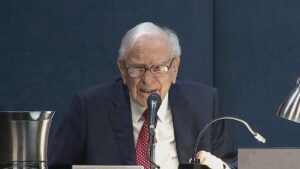Warren Buffett’s Stance on Trade: Lessons for Investors from the Oracle of Omaha
At a time when trade policies dominate global discussions, few voices carry as much weight as Warren Buffett’s. Recently, during Berkshire Hathaway’s annual shareholder meeting in Omaha, Buffett made headlines with a staunch critique of protectionist policies, particularly those stemming from the current U.S. administration. Let’s delve deeper into his insights and what they mean for savvy investors at Extreme Investor Network.
A Call for Global Cooperation
Buffett, without directly naming President Trump, stated, “Trade should not be a weapon.” This powerful declaration underscores the importance of maintaining healthy trade relationships in an interconnected world. He emphasized that slapping punitive tariffs can lead to adverse consequences not just domestically but globally.
In an era where populism can easily influence policy, Buffett reminds us that economic growth and prosperity are not zero-sum games. “The more prosperous the rest of the world becomes, it won’t be at our expense,” he declared. This sentiment is crucial for investors, as it paints a picture of a future where collaborative trade enhances market opportunities for American businesses.
Navigating Market Uncertainty
Investors are often anxious during turbulent economic times, especially with ongoing trade tensions. Buffett’s commentary comes at a crucial moment; Wall Street is weathering extreme volatility partly due to the implementation of historic tariffs. With the U.S. imposing tariffs of 145% on imported goods from China and witnessing retaliatory measures, the macroeconomic landscape is anything but stable.
Buffett’s wisdom is particularly significant for those looking to navigate these uncertainties. His extensive experience across various sectors—from insurance to transportation—offers insights into how macroeconomic changes can affect different industries. This comprehensive perspective is invaluable for investors seeking to mitigate risks and seize opportunities.
A Defensible Position
Interestingly, Buffett has adopted a defensive investment strategy lately, selling stocks over the past ten quarters. In 2024 alone, Berkshire Hathaway divested more than $134 billion. This strategy emphasizes the need for caution and thorough analysis before making investment decisions, especially in unpredictable environments influenced by geopolitical events.
With Berkshire’s cash reserves climbing to a record $347 billion by the end of March, it’s evident that Buffett is positioning the company to capitalize on long-term opportunities when the market stabilizes. For investors, this should serve as a crucial lesson: sometimes, holding cash can be just as strategic as investing it.
The Bigger Picture
Buffett’s insights extend beyond tariffs and trade wars. His call for global prosperity raises an essential question for investors: how can we invest in a way that fosters economic stability and growth? Companies that embrace international collaboration—through exports, partnerships, or supply chain diversifications—are likely to thrive, regardless of current political climates.
At the Extreme Investor Network, we believe that understanding the broader economic picture is essential for making informed investment decisions. By listening to thought leaders like Warren Buffett, investors can glean valuable lessons on resilience, prudence, and forward-thinking strategies.
Conclusion
Warren Buffett’s criticism of protectionist trade policies encapsulates a broader philosophy that values cooperation and global prosperity. As investors, let’s heed his wisdom and adopt a balanced approach—embracing opportunities while remaining vigilant to market changes. The path ahead may be fraught with challenges, but with strategized investments and a global perspective, we can navigate successfully.
Stay connected with us at Extreme Investor Network for continuous insights, expert analyses, and strategies that empower your investment journey!

